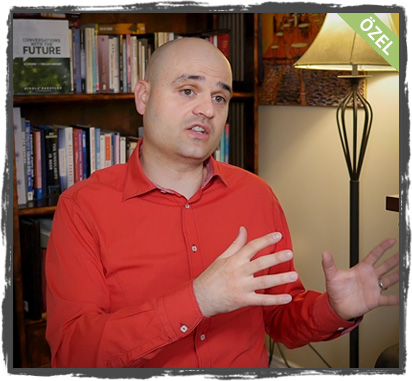 The first time I met Omer Ozdemir was at my Conversations with the Future book reading when Omer drove more than 4 hours just so he can be there. So when he asked me to do an interview for the Turkish Her-An website I was very happy to do it, even if I was sick with the flu at that time.
The first time I met Omer Ozdemir was at my Conversations with the Future book reading when Omer drove more than 4 hours just so he can be there. So when he asked me to do an interview for the Turkish Her-An website I was very happy to do it, even if I was sick with the flu at that time.
Her-An is a platform that covers a wide range of popular topics including Transhumanism, Singularity, Advanced Technology, AI, AGI and Venture Capital, and Technology Investing. As Transhumanism and Singularity have evolved into the very center of all these topics, a big part of the articles and interviews in Her-An eventually revolve around Singularity and Transhumanism.
You can see the original article published in Turkish or you can watch the video produced by Omer Ozdemir, directed by Mahmut Taşdemir and edited by Akif Manisalı. Hope you enjoy watching this video as much as I enjoyed recording it because I think these questions managed to push me to go a lot further than usually. 😉
Here are the questions I was asked to reply to:
Part I:
0:13
1. When we analyze the Singularitarian camp through MIRI, FHI and SU, we see SU on one side, led by Kurzweil, and seemingly unconditionally prone to view any technological development as positive and accept them; on the other side we see FHI, lead by Bostrom who is academically
more on the traditional side, vocal about his concerns and what he perceives as problematic, but still enthusiastic about AGI; and on the third side we see MIRI that collaborates also with FHI despite the financial contributions of Peter Thiel’s circle of influence and Eliezer Yudkowsky’s intellectual leadership, both of whom have not been heard much from since 2013. Is this actually a simple matter of differences of opinion, or can this be seen as an attempt by figures like Kurzweil, Bostrom and Thiel to secure their respective positions in the new order they expect will be established as a result of Singularity?
5:09
2. What kind of impact would reciting the Ancient Greek aphorism “Know Thyself / Gnothi Seauton” attributed to Socrates, have on the mankind of our age who are continuously bombarded with information and faced with the technological developments of today? What should we understand from the concept of man “knowing himself”? We observe that in our time, the physical and biological attributes of Man are being discovered much more rapidly and in greater detail, but the same level of insight is not gained on matters related to “Man’s Soul”. Would you say this is a sort of incomplete “knowing of thyself”? What kind of consequences can “not knowing thyself” cause in the long run?
10:32
3. Your speech “Emperor Has No Clothes!” put into words what many had thought about but had not spoken out loud by that time. Were you able to get the reactions you were looking for? You had stated that you had received a response from Singularity University, Rob Nail had reached out and listened to your views. What do you think had changed during the considerable time that has passed since then?
16:06
4. Science and democracy do not always play by the same rules. Science produces clear answers based on information, whereas democracy is in a sense shaped by the opinions of the majority and contrary to science, progresses based on mutual agreement and compromise. How do you see the Singularitarian community shaping up in American democracy as a “science” community? Do you see Singularity University or similar entities shaping themselves according to the rules of an open society, or do you see them slipping into a community culture, where criticism or mutual agreement is hard to come by under the influence of men of power?
20:05
5. You present many with an invaluable source on Singularity/Transhumanism they cannot find anywhere else. Your questions delve into the very essence of many topics you cover. In regards to all those you have inspired with your work, what more would you like do for them if you had much larger resources and reach?
26:06
6. The common trait among technologists like Elon Musk, Larry Page and Peter Thiel is that they are entrepreneurs who embrace the motto “just do it”. If we were to define them, their business acumen, technologist characteristics and financial talents would be emphasized greatly. But the idea that they’re “philosophers” or “thinkers” may not come to others’ or even their minds in defining them. Nevertheless, due to their speed in business and the speed of the technologies they invest in, they can easily be placed at the center of any discussion concerning the future of science and technology (For example Google has a seperate company about almost all of the areas we have talked about Singularity/Transhumanism). What should be the conclusion we should reach from this? “Doing” seems to have taken a step in front of “thinking”. How do you evaluate this trend? Can we see these figures as “thinkers” of the new age?
Part II:
0:10
Russia has a strong academic tradition. It also has a large resource of educated individuals in information technologies, especially in software engineering. Russia is also home to Dmitry Itskov and his 2045 Initiative. Although their main target is immortality as opposed to Artificial Intelligence, how do you foresee the role of Dmitry Itskov and in general Russia in immortality and AI research?
5:48
India is a is a very fast growing market in software technologies that always has a cost advantage when compared to the rest of the world. Would you say, Indian software engineers not being allowed into the country as a result of the “travel ban” of post-Trump America, would lead to new formations in countries like India who provide vast human resources to the rest of the world?
11:31
If we take into account that America is the center for Ray Kurzweil’s Singularity vision and most of the technologies related to it, can the visa policies of the Trump presidency slow down the development of technologies leading to Singularity? In that sense, is it also possible for venture capital companies to increasingly head out of the United States?
15:41
How do you see the future of China? We have an idea of the Russian front through Dmitry Itskov’s work, and America seems to be the driving force in all matters related to Singularity, but we know comparatively little about developments in China. You interviewed Hugo de Garis, who along with Ben Goertzel are two figures who moved to China very early on, and place great importance towards the region. Can you share your opinions about China and its place on the road to Singularity?
22:29
You have interviewed many experts about Human Level AI, all of them experts in their respective fields. Has all this formed a personal prediction on your part about when Human Level AI can be achieved?
31:32
How do you see yourself as: A Singularitarian, a Transhumanist or maybe a Seeker of Truth?

 This Thursday I did an interview for
This Thursday I did an interview for 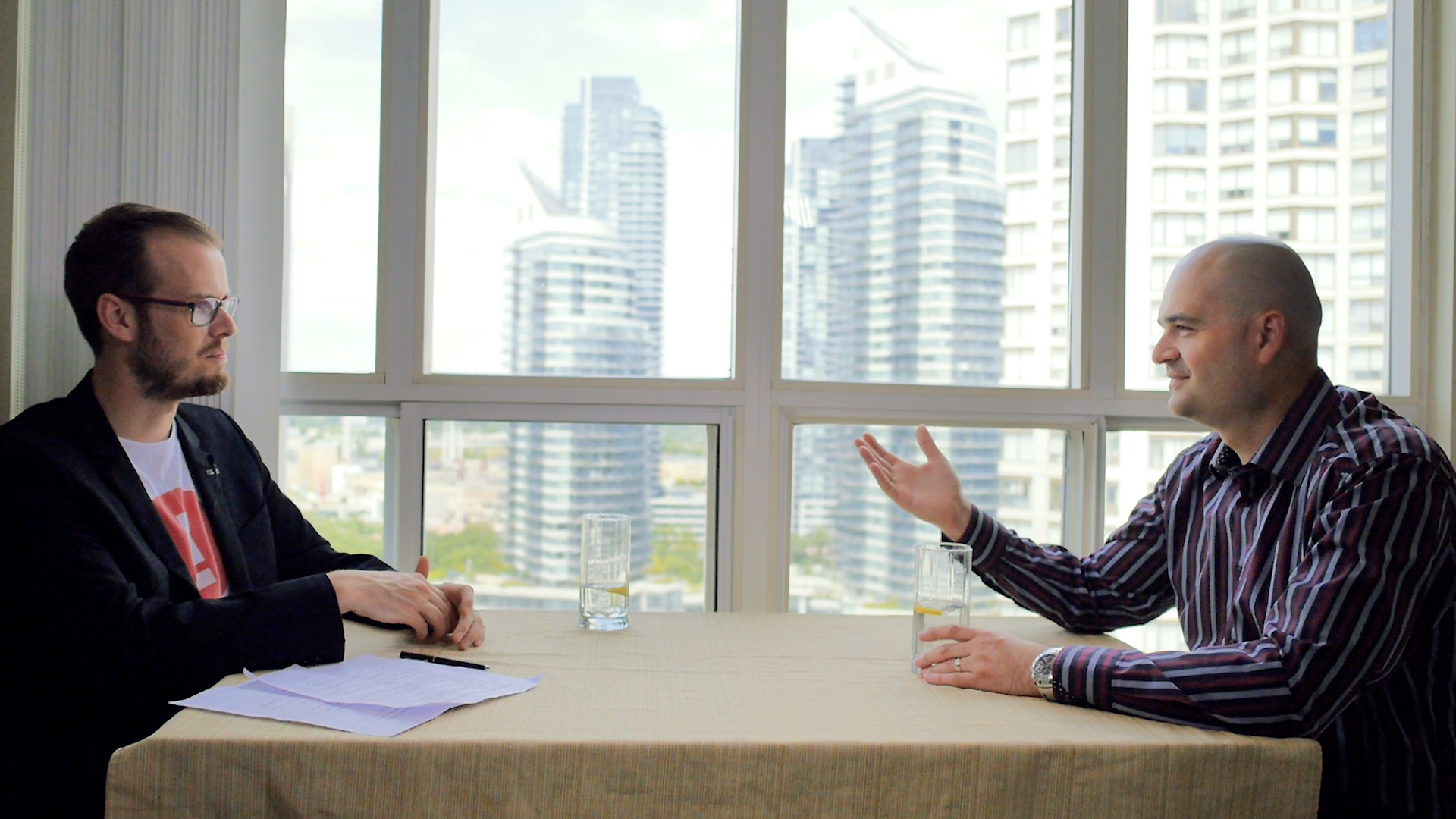 Every once-in-a-while, it is a good thing to do a headstand and look at the world from a different perspective. In podcasting terms that would mean putting Socrates in the hotseat and making me answer questions, rather than let me hide in asking them. And I could’t think of a person better qualified to do that than
Every once-in-a-while, it is a good thing to do a headstand and look at the world from a different perspective. In podcasting terms that would mean putting Socrates in the hotseat and making me answer questions, rather than let me hide in asking them. And I could’t think of a person better qualified to do that than 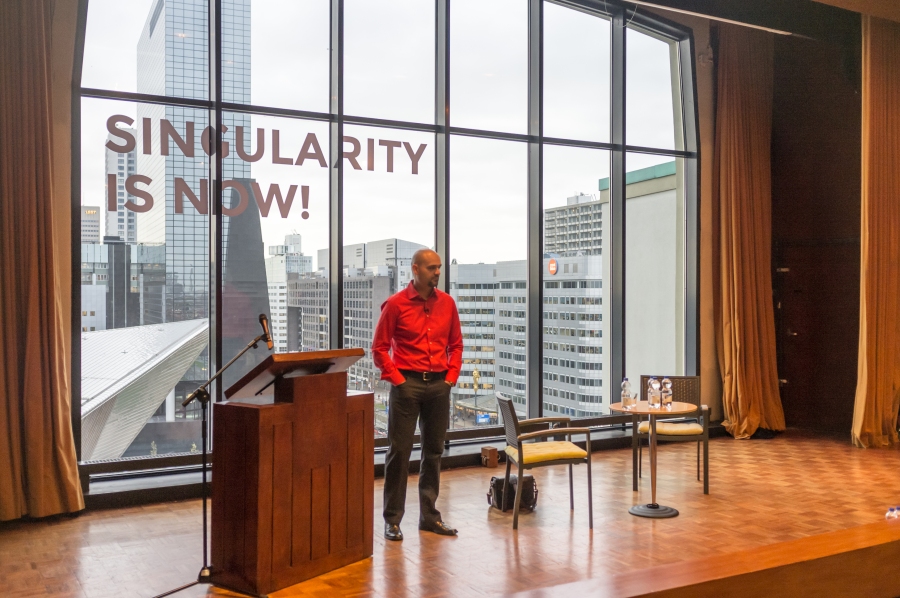
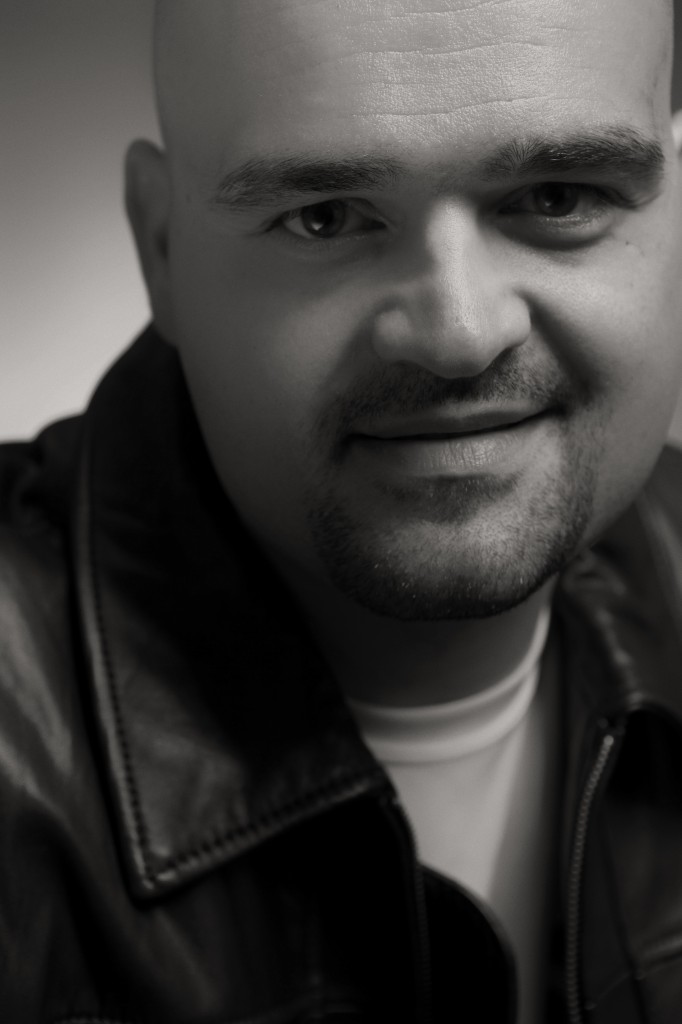 On November 17, 2015 Singularity University Netherlands is organizing a
On November 17, 2015 Singularity University Netherlands is organizing a 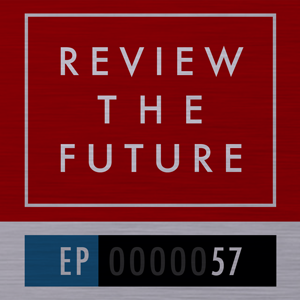 A few weeks ago I got interviewed on
A few weeks ago I got interviewed on 
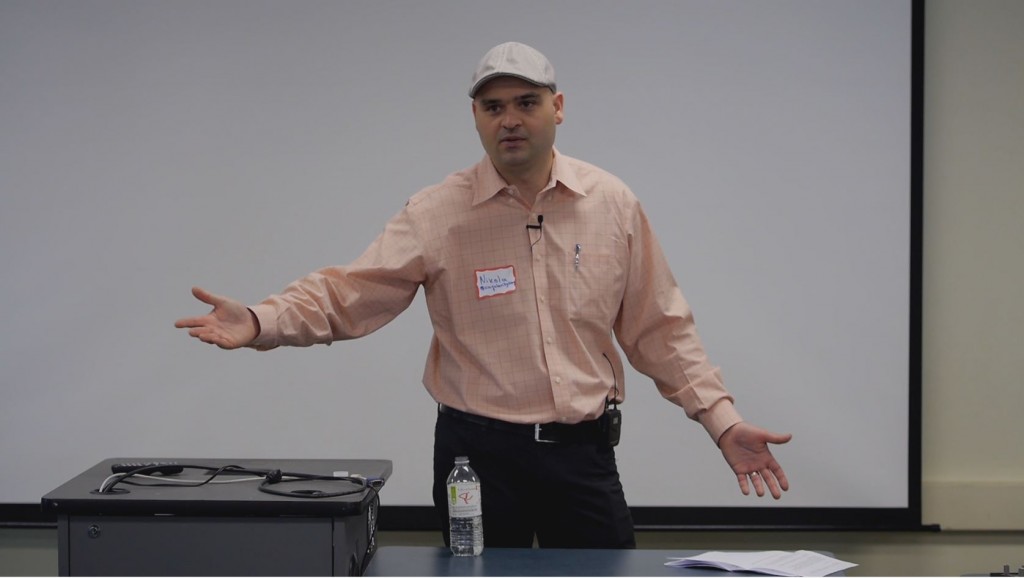


 A few weeks ago I got interviewed on the
A few weeks ago I got interviewed on the 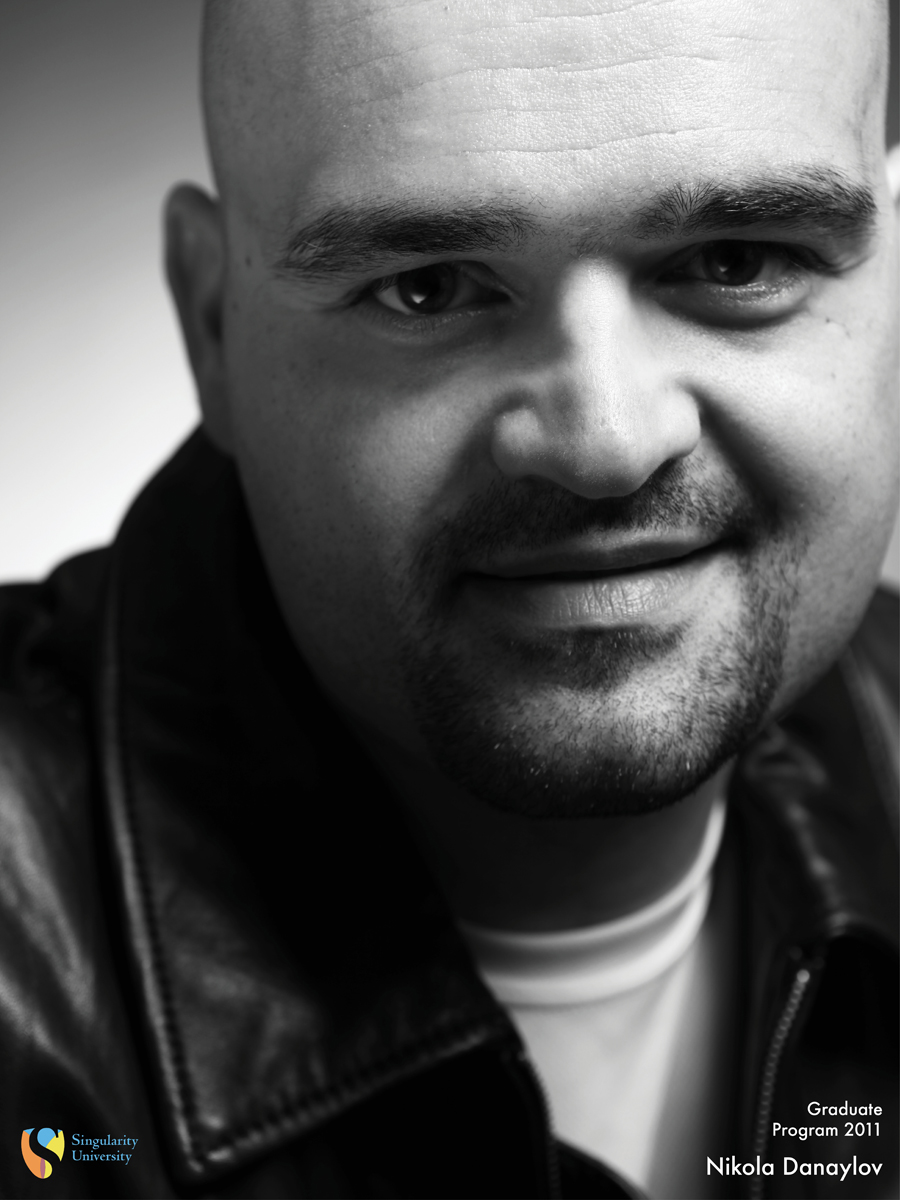 I know how hard it is start a podcast. So when budding podcasters ask me for an interview, I am always looking for reasons to say “Yes.”
I know how hard it is start a podcast. So when budding podcasters ask me for an interview, I am always looking for reasons to say “Yes.”
 Lincoln Cannon
Lincoln Cannon Lincoln Cannon is a philosopher and programmer, promoting change toward radical flourishing in creativity and compassion through technology and religion. He has over fifteen years of professional experience as a software engineer, Internet marketer, information technologist, and leader of technical teams in the development and integration of web, mobile and management information systems. Lincoln holds degrees in business administration and philosophy. He is married to Dorothée Vankrieckenge, a French national, and is father to three bilingual children. In his spare time, Lincoln serves as president of the Mormon Transhumanist Association.
Lincoln Cannon is a philosopher and programmer, promoting change toward radical flourishing in creativity and compassion through technology and religion. He has over fifteen years of professional experience as a software engineer, Internet marketer, information technologist, and leader of technical teams in the development and integration of web, mobile and management information systems. Lincoln holds degrees in business administration and philosophy. He is married to Dorothée Vankrieckenge, a French national, and is father to three bilingual children. In his spare time, Lincoln serves as president of the Mormon Transhumanist Association.